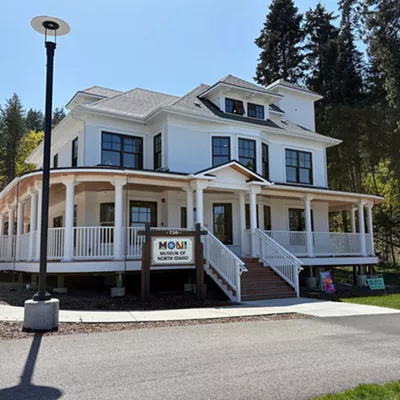The assertion that "when WSU acquired the property, they threw the market off and essentially killed it," is not accurate. The fiscal agent of the Riverpoint Higher Education Park, as it was then known, was the old Joint Center for Higher Education (JCHE). As a state agency, the JCHE received an attorney general ruling requiring it to charge market rates for any and all leases. The fledgling farmers' market could simply not afford market rates for Division Street frontage. WSU did not own the property until a legislative change was made two years later.
Paul Haeder's article on "Reclaiming History" describes an interesting array of alternative development scenarios for the University District. A rehabbed Jensen-Byrd building could be part of most any campus development plan. One need not go clear to Faneuil Hall to see classic renovation. The University of Washington's Tacoma Campus is built in old warehouses in the downtown area. It is an exceptionally well-done project, housing several thousand students and anchoring downtown renovation.
I hope that in our zeal for creative class development we do not forget the primary mission of higher education -- the education of students and the conduct of research. Kitchen incubators, radio stations, and farmers' markets are important assets for any community, but not necessarily consistent with the role of a university campus.
In Spokane, we have a most enviable resource -- 50-plus acres of ground dedicated to higher education development adjacent to the downtown core. While that may sound like a lot of property, it is actually quite small, even for an urban campus. The university community will need to be very careful to protect that asset for future generations. There will be hundreds of opportunities to carve off parts of the campus for seemingly worthwhile initiatives like the Phoenix Project. But to be the real engine for economic development in the region, the campus will need to not only continue developing its intellectual critical mass, but also to protect its physical infrastructure.
William H. Gray & r & former Dean of WSU-Spokane
Eye Spy & r & The Bush Administration's warrantless surveillance on American citizens is illegal. It is, in fact, unreasonable search and seizure and it truly invades our privacy.
What is making his actions illegal is that he is not complying with the Foreign Intelligence Surveillance Act passed in 1978, which sets regulations for law enforcement and the government when performing wiretaps. For the NSA to perform wiretaps among citizens within United States borders, they are specifically required to obtain a warrant through the judge. However, Bush has taken a different stance so he can get around the regulations of FISA, which is the president's inherent powers and authorization.
Another way they are claiming that the administration's actions are illegal is through Authorization of Military Force. Their position is that they believe the president has the power to conduct surveillance in order to fight Al Qaeda. However, this only applies when it is necessary force against whatever country, persons or nations.
It also has been argued that warrantless surveillance is a necessary part of war, and that is true on the battlefield, but performing warrantless surveillance on citizens isn't a battlefield situation.
Looking at all of this, I personally do not understand why the president just couldn't go through FISA. It is a relatively quick process and it provides emergency surveillance procedures if necessary. In addition, my question lies in the effectiveness of surveillance. Does it work? As citizens being the subjects of surveillance (or partners of surveillance), we have the right to know if this warrantless surveillance is truly fighting terrorism. I believe that it may be helping with crime, but not with terrorism.
Megan E. Foland & r & Cheney, Wash.
Peace Is Every Step & r & Not much lip service is given to peace any more. Personally, I like the idea, but don't think humans will achieve it. But just in case, here are some things that must be understood before it can happen:
1. Criticizing the actions of the Israeli government is not anti-semitism. Their treatment of the Palestinians has been similar to our treatment of the American Indians. The tribes were once demonized, but today we clearly see that we took this country from them. A same evolution of thought must happen between Israel and Palestine.
2. America is not a Christian country. If Jesus Christ ran this country, it would not be a world economic leader, with the most powerful military on the planet. Jesus was not interested in money, and he had no love of war. He'd be beating swords into plowshares.
3. The actions of terrorist extremists have nothing to do with what Mohammed taught. Many people don't say this for fear of reprisal, but this must be said. Well, I'm at peace with my God, let them kill me. But know first that I am not anti-Islam. I have deep respect for Mohammed and his teachings.
Indeed, I have deep respect as well for Judaism and Christianity. I try to follow the teachings of Christ myself. But I think that today, most Christians, Jews and Muslims are listening to their holy men too much and not their prophets. Ministers, priests, rabbis, mullahs and ayatollahs are only human, and prone to the deadly sins like any human. It's time we all stopped following and began leading, because all of our leaders, religious and political, are failing us.
That's the recipe for world peace. Are you one of the ingredients, or just a fly swimming in the batter?
Carl David Leeth & r & Spokane, Wash.
What Conservative Party? & lt;BR & When I was a teenager in the 1960s, dabbling in politics, my mom and dad left the Democratic party. They'd had enough of street protests and flag burnings, and made for the shores of the party of Eisenhower and Nixon. They'd seen Democrats try to solve all problems by throwing away money, but government, they reasoned, should conserve. They were conservatives. They didn't like the idea of government being in debt, and were aghast at this new thing called a "trade deficit." The 1994 "Republican Revolution" would've especially thrilled them. Small government and welfare limits would've been right up their alley.
But they were true conservatives. Yes, keep government out of your pocketbook, but also out of unnecessary wars, your bedroom and your telephone records. If they were alive today, they'd be appalled at the number of Republican Congress members under investigation for corruption. They'd have just called it stealing. They would have found the Republican's trillion-dollar boondoggle in Iraq just as offensive as the useless Democrat-led government agencies of their own day. And the idea that a Republican president would move America from a surplus to this yawning, endless deficit would've made them furious. After all, isn't that what "tax and spend" Democrats did? But Democratic spending was a drop in the bucket compared to current Republican pilfering. No wonder commentators like George Will and have long claimed that Bush and the current Republican crop, with their mounting legal bills, are not conservatives at all.
Me, I'm a liberal, a bit homeless in the current climate -- but if my parents were alive, they'd feel just as adrift in today's "Party of Abe Lincoln."
Lawrence Mings & lt;BR & Spokane, Wash.
















